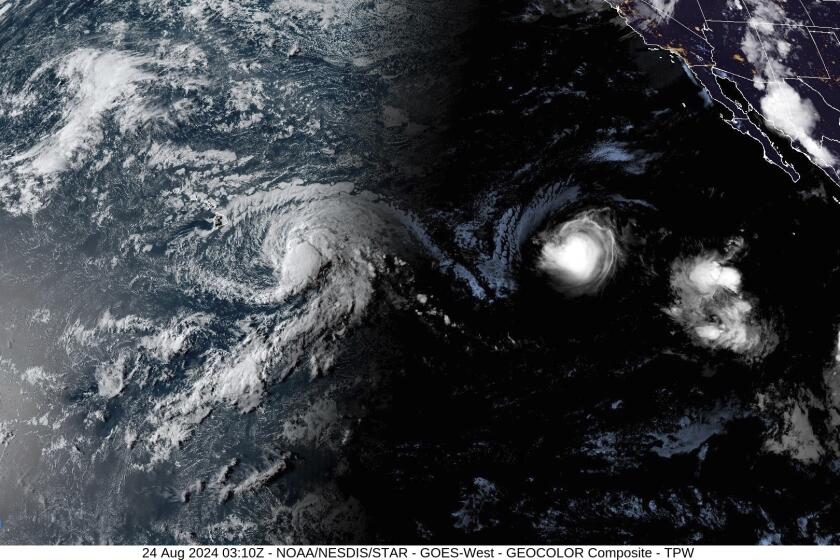Netanyahu Faces New Roadblocks to Deal on Disputed W. Bank City
Prime Minister Benjamin Netanyahu on Friday faced dual challenges from his own right-wing constituency over settlement policy and a Hebron agreement that he has yet to conclude with the Palestinians.
In a move that threatened to further complicate Hebron negotiations, Jewish settlers and their children temporarily occupied a disputed hilltop outside Beit El, installing mobile homes, sewage pipes and a jungle gym before hundreds of Israeli police and soldiers arrived.
At the same time, three more government ministers added their names to the list of Cabinet members who might not support a Hebron deal, raising the possibility that Netanyahu may lack the votes he needs to approve an agreement once it is reached.
Netanyahu’s right flank reared up as U.S. Middle East envoy Dennis Ross continued shuttling between the prime minister and Palestinian Authority President Yasser Arafat in a bid to bring the leaders together to sign a deal for the withdrawal of Israeli troops from most of Hebron.
Israel blamed Arafat and his ally, Egyptian President Hosni Mubarak, for the delay. The Palestinians said it was Netanyahu’s fault for refusing their demand to place a Palestinian liaison officer at Hebron’s Cave of the Patriarchs, a site holy to Muslims and Jews, and to obtain an Israeli commitment to carry out further redeployments in the West Bank by September.
Netanyahu reportedly spoke to Arafat by telephone about the pressure he was under from the right wing, but there was no movement on either side.
Palestinian officials denounced the settlers’ land grab as another provocation two days after an off-duty Israeli soldier shot up Hebron’s Arab market in an effort to prevent a redeployment.
The residents of Beit El, about 10 miles north of Jerusalem, sneaked seven mobile homes onto the rocky hilltop between their settlement and the Palestinian village of Ein Yabud before dawn Friday, employing a tactic that settlers have used in the past to build some of the 145 Jewish enclaves in the West Bank and Gaza Strip.
They said they were building a new neighborhood to avenge the murders of Beit El residents Etta and Ephraim Tzur by Palestinian gunmen last month and, at the same time, to derail a Hebron deal.
Throughout the day the settlers prayed, raised Israeli flags and laid a stone path, digging deeper into the disputed land as their leaders negotiated with the government and the army poised to remove them by force.
“I am afraid the Arabs will seize this land if we don’t,” said Orit Litov, 23, who set up house on the hilltop with her husband and 6-month-old daughter.
Yoel Tzur, whose wife and son were slain by gunmen, said: “We don’t want a confrontation with the government, but we want to clarify our determination to them and explain our needs.”
A sign posted in the rocks and thorny brush nearby said the “new neighborhood Maoz Tzur” would be built in memory of his loved ones.
After the shooting, Netanyahu refused the settlers’ request to build 1,500 homes in Beit El, apparently fearing that it would incite the Palestinians.
Instead, Netanyahu offered them financial aid and social benefits, an alternative that the settlers found inadequate and the Palestinians protested as a move to expand the settlements.
Israel captured the West Bank from Jordan in the 1967 Mideast War.
Arafat wants the territory, which has about 1 million Palestinians, for an independent state.
The settlers complain that Netanyahu voices support for their position--to hold on to the land--but does not allow them to expand their communities in the area they call by its biblical name, Judea and Samaria.
“We know what his convictions are supposed to be,” said Beit El resident Yedidia Atlas, adding ironically that the demonstration would give Netanyahu “support to have the courage of his convictions.”
In the end, however, the settlers agreed to go home for the Sabbath and to remove the mobile homes on Sunday in exchange for a meeting with Defense Minister Yitzhak Mordecai.
As sundown approached, scores of settlers and a convoy of police vans moved down the hill.
Maj. Gen. Uzi Dayan, commander of the army’s Central Command, shook his head at the sight.
“It’s unfortunate we have to invest so much energy and forces to enforce the law instead of giving security. But I am satisfied this ended without casualties,” Dayan said.
The settlers, in turn, seemed satisfied that they had made their points on settlements and Hebron.
“Clearly this [occupation] has to do with the Hebron agreement. We are interested in exploding it as soon as possible,” Litov said.
In Jerusalem, things appeared to be moving in that direction even without the settlers’ help.
Justice Minister Tzachi Hanegbi, one of Netanyahu’s strongest supporters in the coalition government, announced that he would not support a Hebron deal if Netanyahu committed to a timetable for further troop withdrawals.
Hanegbi was the eighth of 18 Cabinet ministers to say he might abstain or vote against an agreement.
Israel Radio said two ministers of the religious Shas Party who initially supported the agreement were considering abstaining or voting no.
The switch came in response to instructions from the party’s spiritual leader, Rabbi Ovadia Yosef, that a Hebron deal must assure settlers’ security.
Netanyahu is not legally required to seek Cabinet approval for a Hebron redeployment, but he has promised to submit his accord to the members of his right-religious coalition government as well as to the parliament.
The prime minister would find it politically difficult to proceed with a redeployment if he does not have the support of his own coalition.
“It would put into question his leadership,” acknowledged a senior aide, who added that he expected Netanyahu would get “a bare majority” to approve the accord.
More to Read
Sign up for Essential California
The most important California stories and recommendations in your inbox every morning.
You may occasionally receive promotional content from the Los Angeles Times.






